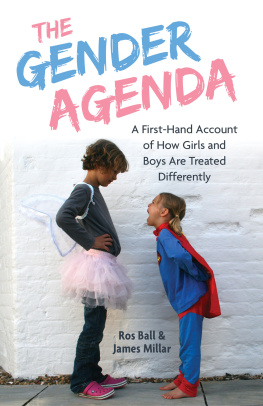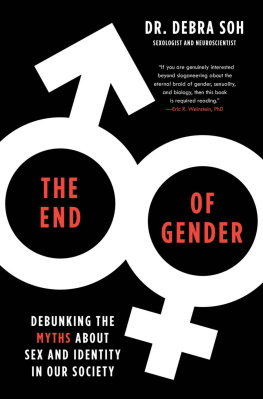
THE
GENDER
AGENDA
A First-Hand Account of How Girls
and Boys Are Treated Differently
Ros Ball and James Millar
Foreword by Marianne Grabrucker

Jessica Kingsley Publishers
London and Philadelphia
CONTENTS
FOREWORD
After giving a lecture to law students at a German university I found myself in a round of students and young lawyers females and males. They were brilliant young people. Of course I expected sophisticated questions on legal problems, but none came.
Instead, a woman started the discussion with the question, Are you Ms, the author of the book Theres a Good Girl ? You should know that I was raised according to your book. I remember very well that it was always in the kitchen at home and my mother reread it whenever she had time. A male student related the same tale. His mother kept the book beside her bed. They started a discussion on gender problems instead of legal issues.
I was expecting criticism, but none came, they agreed with my attempt at a gender-neutral upbringing and assured me that they were happy with the way their parents had guided them to be different from stereotyped gender role models. And as a result, as I could see at the event, females and males were equal in numbers and in their professional positions in their first employment.
Reading Ross and Jamess diary it seems to me that ostensibly things have not changed in 30 years, when it comes to the blue and pink, the tough man and princess questions. Nevertheless daily life for young women has changed for the better and young men are starting to pay more attention to family and their kids and are emphasising the great career less as they were still expected to do one generation before. Statistics in Germany substantiate this trend.
A company employing a generative young guy who is becoming a father cant be sure that he wont ask for paternity leave or part-time work. Not so long ago these things were connected only to women of reproductive age and hereby exacerbated disadvantages in employment.
But I am perplexed: on the one hand, comparing both diaries, obviously nothing had changed in turning a child of female sex into a good girl and a child of male sex into a real boy. All these little stories of a child demanding for this or that, just to be like a girl, a boy, a woman, a manlike all the others, left me bewildered and threw me back 30 years.
How should this polarity be dissolved?
I tried to explain in 1984 why children stick to the role model of pink and blue perseveringly, they wish to be like everybody else to become a proper member of society, to be like all other adults.
In the process of a childs growing up we teach them in many other fields to behave in the way life in our society demands: how to wash hands, to use the toilet, to dress, to use a knife and fork, to be polite, to read and write, to study busily to become a successful person in life. Their duty is to focus on copying the adults behaviour. We thump it into their brain. And why the hell should it be different for gender issues? How to explain the difference to a three-year-old? I think it is not as much how parents individually guide their children, it is more the issue of the overall impression in our society and the behaviour of both genders in practice.
It will be different in future when not only gender-daddy and gender-mummy are different but also all other adults as seen in advertising, on TV, in politics, in movies, toys and in reality in their jobs.
I had the chance to give a lecture to ten-year-olds in primary school on my specific field in law as a judge. When they had written down their conclusions on what they learned, one girls result was, Originally I planned to become a movie actress, but now I changed my mind definitely, I will become a judge.
It is time for women to go into politics and well-paid jobs more than ever, with the intention to alter role models. Furthermore, women should be aware in selecting their future job that they will earn enough to support a family including gender-daddy. By the way, in more and more young couples she is the one who earns more money than he.
It is time for men to stay at home to alter male role models. Females should stay away from the mirror and from domestic chores.
Margaret Mead, the famous American anthropologist in the 1930s, told her daughter, If you cannot abide the dust under the bed you will never be successful in your research,
For now, the show goes on, I am now a grandmother and I still cannot let go of the subject of blue and pink, male and female behaviour with my one-year-old granddaughter.
For example, when she showed an interest in the carabiners I use for rock-climbing her parents suggested that was a dangerous pursuit for a girl even though one of the carabiners was pink!
At Christmas her mother, my daughter, planned to present her to all family and guests in a light grey Italian fashion cashmere dress with dark grey dots no pink, of course: the dress was a present from Granny Marianne. But just before the guests arrived her nappy needed to be changed. It was not a textbook change and the dress got pretty wet! In a hurry I found under the Christmas tree a present from some neighbours, parents of a boy baby two months older than she. They gave blue pyjamas as a Christmas gift which were meant to be for him but were too small. They fitted her perfectly and my grandchild spent Christmas Day dressed in these blue boys pyjamas and, as one auntie pointed out to my pride, she performed not appropriately at all for a young lady at Christmas dinner!
Maybe when I am a great-grandmother we will have another diary to see if there are any further improvements. But even Rome was not built in a day.
Persistence means altering little things steadily. So keep up the good work!
Marianne Grabrucker, author of Theres a Good Girl: Gender
Stereotyping in the First Three Years A Diary (1981)
PREFACE
Woop woop, its the gender police. Woop woop, theyre everywhere but its hard to see them. You may even be one of them but youre such a secret agent even you dont know you are.
Wed always been dimly aware of the gender police, but it was having children that brought the idea into sharp focus. In 2007 our daughter was born, and a frustration with the pink and blue divide erupted in us. When our son was born three years later, it was a second-hand 1980s book from eBay that helped us make sense of that frustration. That book, Theres a Good Girl: Gender Stereotyping in the First Three Years A Diary by German lawyer Marianne Grabrucker, had a significant effect on our lives as parents.
The book is based around a simple but brilliant idea: if you start to make a daily note of the way the world polices a child by gender, you have a record of how girls and boys are not born equal. If they do behave differently, this book gave us some answers as to why. Our kids werent born different, it was the world around them that was treating them differently. The way people spoke to them and the language they used, the toys and clothes they gave them, and the expectations they had of them they were enforcing certain gender roles, they were policing their behaviour.
When someone experiences problems at work they are often told to keep a diary as a record, possibly to be used as a body of evidence in a tribunal. Grabruckers diary had the same sort of power. It compiled the everyday complaint or anecdote into a bigger picture, rather than a jumble of frustrated feelings that something is not right. She notes the effect on her daughter of billboards on the street, casual comments from strangers, and the way other children enforce their understanding of their roles as a boy or girl on their peers.
Next page










